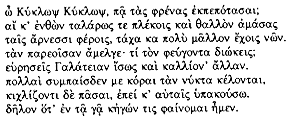|
|
|
|
|
|
|
trifle one might expect. The deviation at the end of 51 reminds us that this is just a translation: the trouble with Catullus is that he has too much time on his hands, the time to translate Sappho rather than getting on with life. But it is impossible to take the final stanza as simply deflating: this is the otium that has destroyed cities and kings, and the intertexts confirm the seriousness of Catullus' point. This is not only a translation: it is also a poem to Catullus' mistress, lux mea, qua viva vivere dulce mihi est. Yet, again, the exaggeration of Catullus' implicit comparison of his own fate to reges . . . et beatas . . . urbes, the contrast between perdidit and molestum est in both sense and register, underlines the irony. This is just a literary exercise: as all literature inevitably is. |
|
|
|
|
|
|
|
|
The expanding circles of irony in Catullus 51 thus dramatise the inevitable dialectic between sublimity and reality which is built into literary discourse. Catullus, writing in an age of lost innocence, can only say: 'I love you madly as Sappho might say'. That age of lost innocence began the second time Adam declared his love: but classicists like to situate it in 3rd century BC Alexandria. If a crucial element in Romantic Irony is an awareness of the anxiety of influence that all saying is saying again then the Hellenistic period is the 'natural' place in which to locate it. One of the models for Catullus' self-address in poem 51, the Cyclops' despair in Theocritus Idyll 11, is a celebrated example.42 Theocritus begins with a framing address to his doctor-friend Nicias declaring that there ain't no cure for love except the Muses: the exemplum that proves this truth is that of  , and we are then given the song he used to sing to Galatea as he sat on the rock. His despairing song ends with a typical piece of lover's self-awareness (729): , and we are then given the song he used to sing to Galatea as he sat on the rock. His despairing song ends with a typical piece of lover's self-awareness (729): |
|
|
|
|
|
|
|
|
 |
|
|
|
 |
|
 |
|
|
O Cyclops, Cyclops, have you gone out of your mind?
You should be gathering browse to feed your lambs
Or plaiting baskets for cheese; that would show more sense.
Milk the beast you can catch; let the others range.
You will find another Galatea with lovelier looks.
The girls call after me, 'Shall I see you tonight?' |
|
|
|
 |
|
 |
|
|
42 See especially Schmitt (1989), an excellent discussion which argues that Idyll 11 is neither simply ludic nor exactly an example of Romantic Irony: although I take a different line, I find myself in agreement with much of what Schmitt says. |
|
|
|
|
|